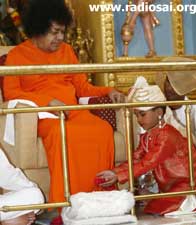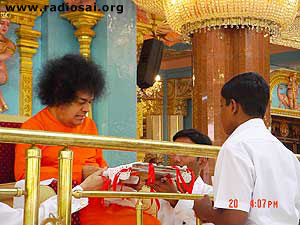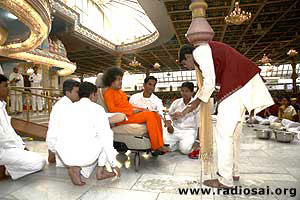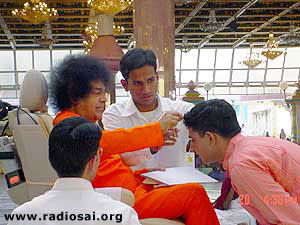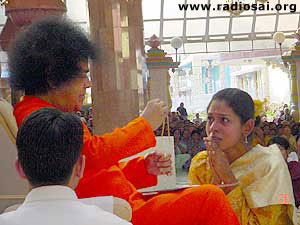PRASHANTI DIARY
CHRONICLES OF HEAVEN ON EARTH
Srikakulum Teachers Parthi Yatra - 5th December 2006
The first week of December will remain indelible in the memories of eight hundred and fifty teachers from more than four hundred and twenty schools in the Srikakulum District of the State of Andhra Pradesh, who had gathered in Prasanthi Nilayam. For these teachers it was a feast of divine love and nectarine wisdom from the very Teacher of Teachers, Bhagavan, Himself. These teachers came to the lotus feet of the Jagadguru to learn the very essence of true education, namely, Sri Sathya Sai Education in Human Values.
A lot of preparation and hard work preceded this glorious event. The Sri Sathya Sai Seva Organization, Srikakulum District, had organized several training programmes for these teachers at various places like Srikakulum, Kasibugga, Sompeta, Budithi and Palakonda. Before the commencement of their spiritual prigrimage to Prashanti, all the teachers went through twenty-one days of intense sadhana and selfless service which included distribution of books and uniforms to poor school children. Finally, all the teachers with their families, and the covenors and sevadals, totaling two thousand, arrived at Prashanti Nilayam on the 3rd of December, 2006.
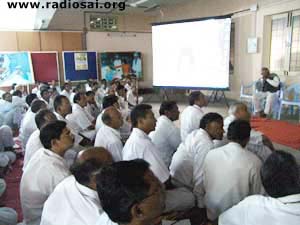 |
 |
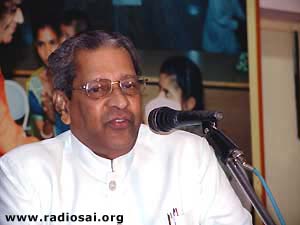 |
Training for the teachers |
|
Prof. Kamaraju Anil Kumar |
Swami graciously blessed all the programmes the group had prepared. First there was a four day extensive training programme for the teachers inaugurated by Sri B. V. Ramana Rao, the National Service Wing Coordinator of Sri Sathya Sai Organization, at Prashanti Nilayam on December 3. Other eminent personalities were also in attendance such as Prof. Kamaraju Anil Kumar and Dr. M. Anil Kumar of the Sri Sathya Sai Institute of Higher Medical Sciences, Bangalore, who gave the opening lectures. Thereafter eminent professors and Doctors of Swami’s Institutions delivered their enlightening discourses on EHV with a helpful amount of visual and audio aids. Indeed, the teachers drank deep from the wealth of knowledge and authority of experience which the speakers cheerfully shared with all.
On the evening of the December 4, the group conducted a rally on Human Values depicting the glory and splendour of Indian Cultural Heritage from thirty-six cultural events in Srikakulum District. It was a sight to behold, a feast for the soul, a festival of colours and sounds, drums and costumes, dances and choruses. The group, like the armies of the Lord, marched from the old Mandir through the Stadium to the thrill and joy of the audience.
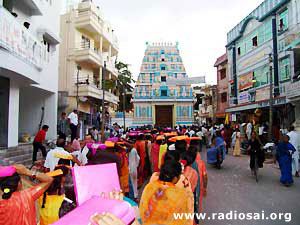 |
 |
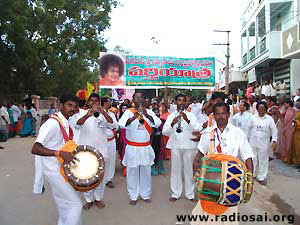 |
In a grand rally on the streets of Puttaparthi |
|
The rally regaled the village with their music |
On December 5, in the Divine Presence of Swami, the group again went on a procession illustrating the integration of EHV into their lives. Their presentation emphasized that Human Values must become one’s way of life. After the procession the teachers enthralled one and all with a series of musical songs directed by Sri Saluru Vasurao.
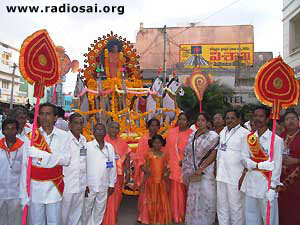 |
 |
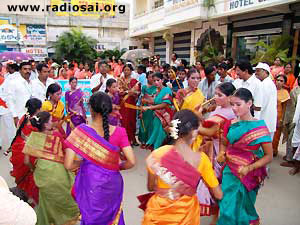 |
Carrying the lord in procession |
|
Folk dances from Srikakulam |
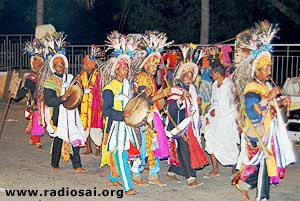 |
|
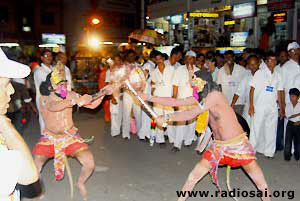 |
Traditional music from interior Andhra |
|
Recreating Ramayana - the folk art way |
The climax of joy came when Bhagavan consented to the prayers of the District President, Sri Lakshmana Rao to bless the group with His Divine Discourse. In His Discourse, Beloved Swami showered upon the teachers the very essence of His Divine Benediction. He revealed that the teachers from Srikakulum are great devotees who have experienced the Divine principle in thought, word and deed and enjoyed the bliss thereof. Swami exhorted the teachers in sweet endearing words to infuse self-confidence and spiritual thinking (that is contemplation of God) in the students and to bear all difficulties in bringing this about. Swami told the teachers: “Bear all difficulties and suffering and make every effort to inculcate goodness in children. That is your primary duty. Teachers are the true leaders of the country, not political leaders. Only teachers can make the children good.”
Swami further encouraged the teachers to cultivate good habits and lead an ideal life. Only then will they be able to teach the children to cultivate good habits. “When the teacher is addicted to smoking, how can he tell the students not to do so? It is only when the teachers cultivate good habits and good conduct, can students emulate their example and strive for the welfare and progress of the country.”
Swami finally concluded His Divine Discourse with these words: “I am very happy that many teachers have come from Srikakulum. Whatever good that you know, you must first put into practice and then teach the children.”
To crown the bliss of the teachers, after His discourse, Swami, in His motherly compassion and love offered a divine dinner to all the participants. Their joy on learning of this most auspicious blessing cannot be translated into words.
What has a beginning must have an end. The valedictory function was held on the 6th morning. Sri Ravi Manchanda, President of Sri Sathya Sai Schools, UK gave the valedictory address while Prof. Anil Kumar, Dr. Sasi Bala and Smt K Vasumathi addressed the teachers. In the evening of the same day, all the teachers with their families returned home full of boundless happiness and bliss. Swami had endowed them with the Divine strength and wisdom to serve the world and to infuse the Sai gems of education in human values into their fortunate students.
Drama Presentation by the Rishikesh Sathya Sai School – 11th December
A huge group of hundred and nine boys from the Sri Sathya Sai School at Rishikesh made the visit to Puttaparthi on December 6, 2006. All the small boys who stayed for a week were from class 1 to class 9 and accompanied by ten teachers, a few staff members and the Principal of the school.
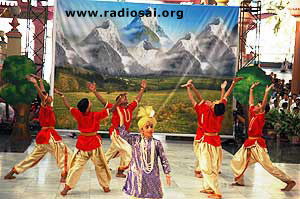 |
 |
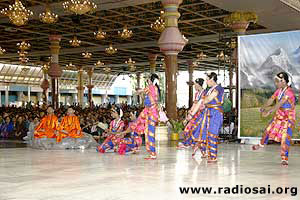 |
The Rishikesh Sai students in symphony |
|
The Badrikadham katha in progress... |
The Sri Sathya Sai School at Rishikesh was inaugurated by the Divine Hands on July 2, 2000. The school at Tapovan, Rishikesh is situated adjacent to the hallowed Laxman Jhula pedestrian bridge at a very scenic spot with the Ganges flowing majestically on the southern side and the serenely green and grand mountains standing sentinel on the northern side. This residential school that propagates human values along the lines practiced at Swami’s school at Puttaparthi provides high quality English medium education for no fees, whatsoever.
On the evening of December 11, the Rishikesh Sathya Sai School presented their drama, "Life is a pilgrimage", depicting the story of Nara and Narayana doing penance for the downfall of the evil Sahasrakavacha Dambhodabhava. It started with three young students from the Rishikesh Sai School playing bhajans on flutes in the centre of the Hall, while a few tiny tots offered flowers at Bhagavan's Lotus Feet.
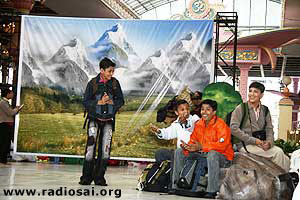 |
 |
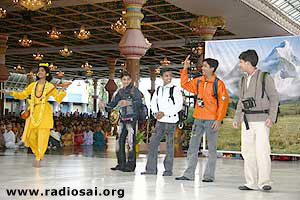 |
Four students on a pilgrimage.... |
|
Saga Narada appears out of the blue! |
The story began with four students of the School going on a pilgrimage to sacred Badrinath. Awed by the serenity and peace, they contemplate on the legendary story associated with Badrinath. All of a sudden they hear someone chant “Narayana Narayana”. They stand rooted to the ground stunned to see none other than Sage Narada himself. They offer their salutations to the sage who asks the students to introduce themselves. The sage is full of joy when he learns that the students are pursuing their education in Rishikesh High School. He, then, narrates the sacred legend of Badri and that of Nara-Narayana.
The story goes thus: The evil demon king Dambhodabhava, in pursuit of attaining the boon of immortality does penance and pleases the Sun God. Unfortunately for the demon, the Sun God refuses to make him immortal but grants him any other boon. So the witty demon conceives a plan and asks for such a boon that would indirectly grant him immortality.
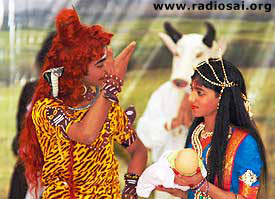 |
 |
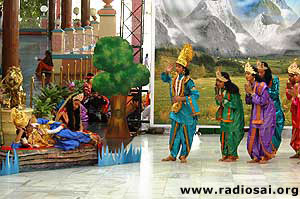 |
Lord Shiva permits Parvati to keep the baby |
|
The Devas approach Lord Vishnu for protection |
The King of Gods, Indra, along with his ministers flee from the Heaven straight to Vaikuntha, the abode of Lord Vishnu. Lord Vishnu majestically reclining on the Adishesha assures Indra and his ministers that He will protect them.
Lord Vishnu then proceeds to the Himalayas where He finds, to His utter dismay, Lord Shiva and Goddes Parvati performing the Tandava (cosmic dance). The witty Lord Mahavishnu assumes the form of an infant and starts wailing. Mother Parvati hears the desperate cries of the infant and pleads to Lord Shiva to allow Her to fondle the babe to stops it wailing. When the Divine Mother found the crying babe, within the blink of an eye the infant disappeared and instead stood the sustainer of the entire universe, Lord Mahavishnu.
Lord Vishnu then tells the Divine Mother that the spot where Lord Shiva was performing the cosmic dance with Mother Parvati was the very spot where He needed to perform penance to slay the wicked Demon king.
 |
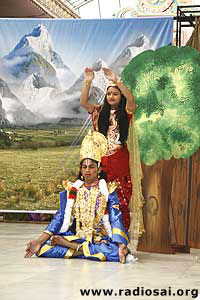 |
| |
Lakshmi takes care of her Lord |
As Lord Vishnu is deep in penance, unmindful of the extreme weather, Mother Lakshmi is intensely troubled and worried due to the Lord’s absence in Vaikuntha. She sets forth in Her search to locate Lord Vishnu. When She reaches the Himalayas, She meets Sage Narada who directs Goddess Lakshmi to the exact spot where Lord Vishnu was performing penance. Apprehensive about the cold winds and the frosty snow, Goddess Lakshmi assumes the form of the Badrika tree, spreading the branches over Her Beloved, protecting Him. It is only when He completes His penance that Lord Vishnu realises the concern and love with which Goddess Lakshmi bore the acute weather and cold winds Herself with the only intention that Her Lord could perform His penance peacefully without any obstacles.
Pleased with this act of devotion, Lord Vishnu blesses Goddess Lakshmi profusely saying that this place would be henceforth known as Badrikadham and He would Himself reside as Lord Badrinath in this place for eternity. He also blessed Her saying that for ages to come, Her name would always precede the Lord’s, as in Lakshmi-Narayana, Radha-Krishna or Sita-Ram.
The Lord then assumed two forms, one of Nara and the other Narayana. Both did penance at the same spot where Lord Vishnu did penance. The demon sent many dancers to distract Nara and Narayana from doing penance but absolutely nothing could stop them from their spiritual rigour. While Nara fought with the demon, Narayana performed penance for one day. In that one day Nara broke one of the one thousand kavacha’s (protective shield). The next day Narayana continued the fight, destroying the second kavacha of Dambhodabhava while Nara performed penance. In this way they fought with Dambhodabhava until only one kavacha remained.
Petrified by the very thought of death, the wicked demon fled from the battlefield seeking refuge with the Sun God. Both the heroes of the war, Nara and Narayana chased him and demanded Lord Surya to return the demon to them. But Lord Surya who had given Dambhodabhava the promise to protect him, refused Nara and Narayana to hand over the demon. Finally it was Narayana who declared that the last of the thousand kavacha’s would be broken by Nara in the Dwapara Yuga when Nara would be born as Arjuna and the wicked Dambhodabhava as Karna.
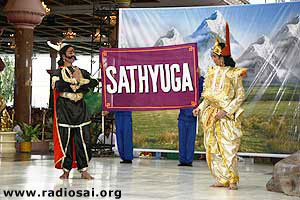 |
 |
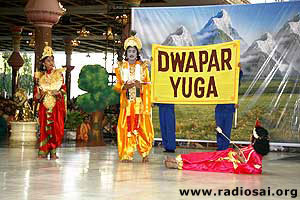 |
Badri - a place of immense importance throughout the ages - Sathya Yuga, Dwapar Yuga, etc. |
When Karna lay wounded on the battlefield waiting for the messengers of death, he asks Lord Krishna the reason for suffering such a death at the hands of Arjuna. Then Krishna reminds Karna of all the evil deeds he did when he was Dambhodabhava and how he fled from the battlefield and took refuge in Lord Surya and was destined to be slain at the hands of Arjuna.
The young students stood full of joy listening to the legend of Badrinath, picturing every scene in their mind’s eye. The boys then pleaded to Sage Narada to narrate all the breathtaking events that took place when Bhagavan Sri Sathya Sai Baba visited this historic place of Badrinath.
Sage Narada, who said he was verily present when Bhagavan visited Badrikadham, relished in sharing with the students every moment of Bhagavan’s stay in Badrikadham and how the Kaliyuga Avatar rejuvenated the holy pilgrim centre.
He recollected, “June 17, 1958 was a Day of Days, a Day that will be enshrined in the memory of everyone, for years and years. In pursuance of His Mission of re-infusing spiritual efficacy in all Holy Places where men congregate for acquiring peace and joy, Baba that day re-invigorated Narayana worship at Badrinath, by means of a unique ceremony, whose significance is beyond our tiny understanding! His Excellency the Governor of Uttar Pradesh, Dr. B. Ramakrishna Rao, who arranged the entire visit of Bhagavan was also present by His side.
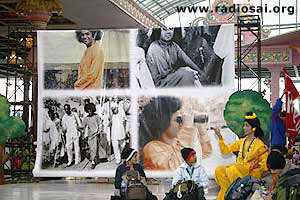 |
 |
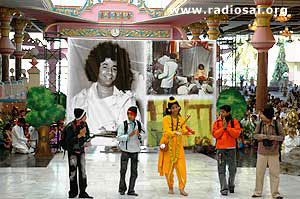 |
Sage Narada recounts Swami's visit to Badri... |
|
Praising the lord Sai Badri Narayana |
During the morning Abhishekam to the idol of Badrinarayana, while Baba was inside the temple facing the shrine, about 8.15AM, Baba mysteriously materialised a four armed Narayana icon with Sankha, Chakra, Gada and Padma, about twelve inches, perhaps sublimating in that form the Divine Essence of the Narayana Tejas before Him. He also created a charming thousand petalled ‘gold’ Lotus, and before the wonder of the people around Him could express itself in an awe-stricken gasp, He waved His hand before the Shrine and, lo, there was a Jyothirlinga in His palm, which He placed on the shining Lotus.
 |
 |
Swami in Badri with mind-boggling manifestations |
|
Materialising a ‘silver’ Abhisheka Vessel full of holy water from Gangothri itself (as He announced), Baba Himself performed Abhisheka to that translucent Nethra Lingam. He had graciously taken the Linga round to everyone and made all to wonder at its quiet effulgence and at a clearly visible Eye that was somehow incorporated in it. Devotees recited Sri Rudram, Purushasuktham and Narayana Suktham, while Baba was pouring the sacred water on the Lingam. Then, Baba created hundred and eight miniature bilva leaves or rather replicas of that holy leaf, in ‘gold’; they fell in a lightning shower from His Palm on to a silver plate.
He again waved His Hand and this time, O Blessed moment, hundred and eight actual ‘thumme’ flowers fresh with even the touch of the morning dew, fell from that Divine Palm! With these, Baba directed Dr.B.Ramakrishna Rao, presumably on behalf of all assembled to do Puja to the Linga, the Ashtottara Puja, as mentioned in the Sastras. After Puja, Baba collected the Abhisheka Ganga and gave a share of it to each one, Himself pouring it into the mouth with His own merciful Hand.
Needless to say, the Lingam, one of the Five, which according to Baba, Sankaracharya brought from Kailasa, and which he installed in a sacred spot in the shrine to vivify the Badarikasram returned to the place from which Baba had drawn it for this epoch making ritual of re-invigoration. The Lotus and the Icon, He granted to the devotees; the Bilva leaves of ‘gold’ He gave to members of the party, as mementoes of the Momentous Day, for being duly worshipped by them.
About 12.30 pm, the same day, Baba condescended to come to Brahmakapal, where the devotees had arrived to offer oblations to the pitris (forefathers). He advised everyone to pray for their ancestors and departed relations, in a spirit of faith and sincerity. Every member of the party had a rare good fortune of paying off the debt to the departed in the immediate presence of the Lord Himself!
Then Baba went down to the Alakananda and took from the surging torrent a glass of water, but, lo! The glass held also a lump of Vibhuthi with the mark of Pranava on it and the til essential for ancestral rites! He poured the water on to the palms of the devotees who were handicapped by disqualifications form partaking in the Pinda Pradan, asking them to offer that water instead! Surely, the manes of all who shared in that day’s Brahmakapal ceremony are thrice blessed!”
Having regaled us with the wonderful recollections of Lord Narayana incarnate, our very own Lord Sai, the programme came to a close. Bhagavan enjoyed their hour-long presentation. The students then sang a few group songs and fervently prayed to Bhagavan for group photographs. Bhagavan called a few small boys from the school and spoke to them. Then He went down from the stage and interacted with the actors. Swami, then, blessed them with a group photograph which had as a backdrop a picture of their school with all the students arranged in front of it.
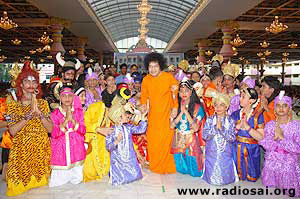 |
 |
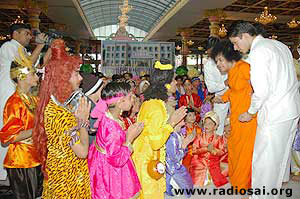 |
Posing with the little flowers of His garden |
|
Few minutes of divine interaction |
But the love story did not end that evening. Next day, Swami called the boy who performed as Narada to the interview room and asked him questions like, “what is your name? Which class do you study in? Who is your Principal? How many boys from his class secured more than 90% marks in the last final exam? What would you like to become when you grow up?” and so on.
|
 |
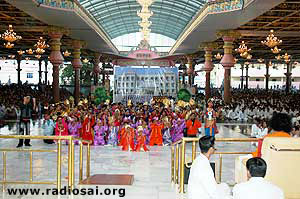 |
A little flower offers a rose |
|
All the children assembled for Sai |
He also gave His word that He would spend time with all the boys in the afternoon in the Mandir. Accordingly students and staff of the school assembled in the Mandir at 2:45 pm. Swami arrived soon thereafter and asked the boys to come nearer to Him. The boys could not control themselves with this motherly beckoning and soon surrounded Swami’s chair sitting around Him.
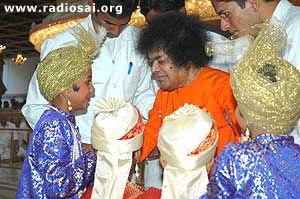 |
 |
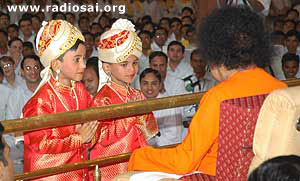 |
Swami talking to the tiny tots |
|
Blessings from their divine mother |
Swami spent an electrifying ninety minutes during which unbounded love flowed towards each and every child. Swami asked them their names, what they would like to become in life, and advised them to be devoted to God. Everybody had tears in their eyes. Swami created three gold chains for three boys.
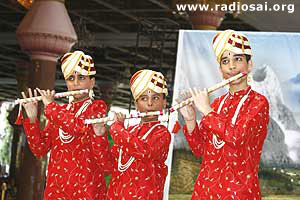 |
 |
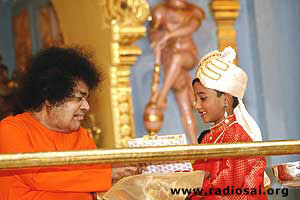 |
The programme started with these three flutes |
|
Swami blesses their card |
Swami also asked the boys to chant Vedam. They chanted for ten minutes. Swami was extremely delighted with their rendering, so much so that He too joined in the chanting. The boys then sang a song.
All through the session, boys were holding Swami’s hand and Swami kept showering His love on them. He also permitted photos to be taken with a few boys at a time. Mother Sai gave Vibuthi Prasad, sweets and clothes distributed to the boys and teachers.
When asked about their impressions of the session with Swami, many boys found themselves speechless. The most common comment was that one came for Darshan but got a whole lot more. Several said that they were not devotees, but now they have become. Boys said that Swami is Mother Sai to them and Swami is the Lord of the Universe. The tears in their eyes told it all. The teachers too echoed similar sentiments repeatedly saying that the experience exceeded all expectations. They were simply overwhelmed with what they saw and felt.
The group left Prashanti Nilayam on December 13, 2006 enshrining Swami in their hearts.
Presentation by the ‘Teen Youth Group’ from Malaysia – 19th December
With a group of ninety eight Sai Teen Youths and twenty Sai Teen Youth facilitators, the Teen Youth Group from Malaysia were in Prashanti Nilayam for thirteen days, full of ardour to present their programme to Bhagavan and attain closeness to the Lord of love. The pilgrimage to Bhagavan also included very special insights into life in rural India by participating in Grama Seva projects in selected villages, during the journey to and from Puttaparthi. The interaction with the local villagers left an indelible but humbling impression in the minds of these Sai Teen Youths.
 |
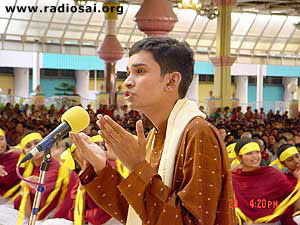
|
| |
Malaysian youth sing to their lord |
The coveted evening when all could stand and act in front of the Lord came on the December 19 when Bhagavan allowed the group of Malaysian SSSEHV Teens to present their adaptation of 'Dikir Barat' - a traditional song and dance cultural item from Malaysia. Fifty one Sai Teen Youth Sisters and forty seven Sai Teen Youth Brothers were involved in the presentation.
Dikir Barat is a traditional Malay art form where a lead singer transmits his message through a short song. The song is punctuated by a chorus sung by groups of men and women sitting separately but whose synchronized and energetic arm and body movements mesmerize and thrill the audience.
The performance was supported by Malay Kompangs (a cross between a drum and a tambourine), a Chinese Drum, and Indian Naals. These three types of instruments represent the three major races in Malaysia – the Malays, Chinese and Indians.
The Dikit Barat is believed to have originated in India where it was performed during the harvest season. It is a verbal art form known for its dynamic performance which revives the audience through its energetic melodies. The Tukang Karut, being the 'head' of the group, usually sings a long song comprising of a chorus and several verses.
The rest of the group is made up of the choir and the percussionists who play the instruments to make the music are called the 'Awok-Awok' means "you all". They are the life of the Dikir Barat group with their choral singing and synchronized body and hand movements which sway rhythmically to the beat of the song, thus, making it an awesome spectacle to watch.
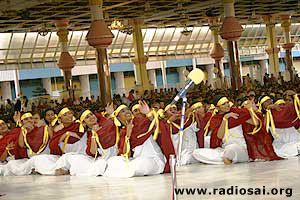 |
 |
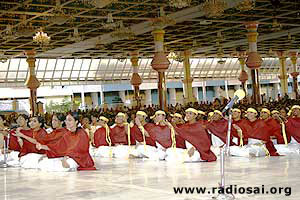 |
The youth in action with vibrant song sequences |
The costumes are usually made up of the traditional Malay baju melayu for men and baju kurung for women. Several touches are added here and there to give the clothes a majestic feel and to liven up the group.
In their twenty minute programme which began just after 4 pm, the common cultural values of the three main ethnic groups of Malaysia were presented with instruments from the various races of Malaysia. The lyrics emphasized Bhagavan’s teaching of unity in diversity.
The entire cultural program was based on Bhagavan’s teaching of respecting one’s parents. The Vedas proclaim “Matru Devo Bhava, Pitru Devo Bhava” - “Mother is God, Father is God” And Bhagavan has been exhorting us to show respect and gratitude towards our parents.
 |
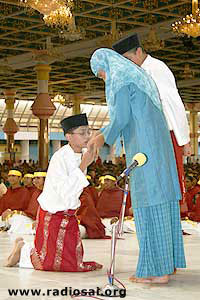
|
| |
Respecting parents - the Islamic way |
The group portrayed this message by depicting the various traditional ways of worshipping one’s parents, from each racial group. The introduction song was sung in the Kelantanese dialect.
The song went as follows:
Eh Wah Eh Wah, Eh Wah Bulan
Eh Wah Bulan teraju tiga
Ini hari sama sama
Sama sama bersuka ria
(meaning “Let all of us be happy and joyous today”)
The chorus group followed with (English Chorus)…
Every morning, I pray to you Swami,
I pray, oh dear Lord, please guard and guide me,
In all my thoughts, my words, and my actions,
All through the day, with every breath I take.
The singer then sang the solo in English (English Solo):
I will love my mother and father,
Respect and follow every word they say,
Speak softly and lovingly always,
And to serve them till their dying days.
I will make them happy at all times,
With peace and love in my heart,
For I know they are my earthly gods,
Precious gifts from heaven above.
This really set the theme for the evening’s program.
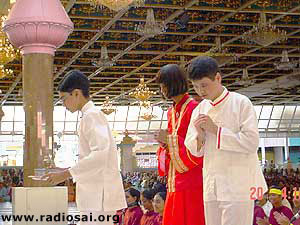 |
 |
Reverence to parents in Chinese culture |
|
The group began with the depiction of a young Chinese boy worshipping his parents. The group of three (mother, father and their young son) walked up right in front of Bhagavan and then performed the formal way of worshipping parents. The boy sat on his knees and then offered a cup of tea, to both his mother and father. In the Chinese Tradition, one of the time honored ways that children show love and gratitude to their parents is through the traditional Tea Ceremony.
The culture of offering tea symbolizes respect and gratitude to the parents .It is also a culture that during meal times when the family eats together, the children show respect for their parents by serving them first. The parents partook the tea and then the three walked back. Meanwhile in the background the solo and chorus groups sang the songs that lay the code of conduct the boy should abide by.
The solo in Chinese:
Shi zun, wo mei ge qing chen xiang ni dao kuo,
Ah! Wo qing ai de zhu, Qing hu you wo, yin dao wo
Hu dao wo de si wei, yan lun, xing wei
Mei yi shun xi,mei yi shi ke, mei yi tian
Wo jiang ai xi wo de fu mu
Zun chong , ting zhong fu mu de jiao dao
Li mou,qing qie kuan dai fu mu
Shi feng fu mu zhi dao tian nian
Wo shi fu mu chang huan xin
Fa zhi nei xin de xiang he he ai,
Yin wei wo zhi dao, fu mu si wo chen shi jian de shen
Shi shang tian shi gei wo zui zhen gui de li wu
(The meaning of the song is the same as the English Chorus and the English Solo above).
The narrator then cited the guidelines set by Confucius. According to him, “When your father is alive observe his intentions. When he is deceased, model yourself on the memory of his behavior. If in three years after his death you have not deviated from your father's ways, then you may be considered a filial child.” ("Confucian Teachings" 20).
According to Confucius, respect to one's father while he is alive is something that even animals do. But, to be a filial child, one must respect his parents even after their death. Confucius goes on to cite further specific examples of what a filial son should do for his parents. Among them, children should never offend their parents, never speak badly of them, not travel far away without purpose, always be conscious of their parent’s age, and protect them whenever necessary. Filial piety is the root of virtue and the origin of culture. The body and hair and skin are received from the parents and may not be injured. This is the beginning of filial piety. To establish oneself and walk according to the right way in order to glorify one’s parents is the culmination of filial piety. Filial piety begins with serving one’s parents, leads to serving one’s king and ends in establishing oneself.
A Malay boy then came dressed in the traditional attire and sang a Malay traditional song:
Setiap Pagi ku.. pohon.. MU
Tolonglah melindungi..ku
Dalam fikiranku dan tingkah laku-ku
Engkau menjadi pedo..manku
Saya sayang pada Ayah dan Ibu
Nasihat mereka kita turuti
Bersopan santun, budi bahasa,
Itulah ajaran me..re..ka
Saya akan mengembirakan Ibu
Saya akan membanggakan ayah
Merekalah tuhan kami
Tuhan kami di dunia ini
(The meaning being the same as the English Chorus and the English Solo songs)
Simultaneously, a group of three youth dressed as the Malay Couple with their young son walked up the path to where our beloved Bhagavan sat. Then they performed the Malay way of worshipping one’s parents. The boy got down on his knees and kissed his parents’ hands and asked for forgiveness for any wrongdoings they might have done. In the Malay tradition, parents are given the utmost respect by their children. It is a familiar saying among the Malays that “Heavens lie in the foot prints of your mother.”
It is also part of the Muslim prayer each day during Solat or Namaz to first pray for forgiveness of the sins of their parents before praying for pardon of their own sins.
Supported by the pantomime, the narrator then shared with the audience the Malay tradition on filial piety, “A child should respect and appreciate his or her parents every day throughout the year. Allah has asked human beings to recognize their parents after recognition of Allah Himself. Throughout the Quran, we notice that parents are mentioned with appreciation and with respect, even if they are senile. In Surah Al-Isra' (Children of Israel) there is a very beautiful description of how parents are to be treated. The recognition and respect of parents is mentioned in the Quran eleven times. In every instance, Allah reminds children to recognize and to appreciate the care and love they have received from their parents.”
The third race widely spread across Malaysia is that of the Hindus. In the Indian Tradition, respect for parents is generally shown by doing padanamaskar. The Hindus believe that when we prostrate with humility and respect, we invoke the good wishes and blessings of elders, which flow in the form of positive energy to envelop us. This is why the posture is assumed, so as to enable the entire body to receive the energy flow from the parents’ blessings.
 |
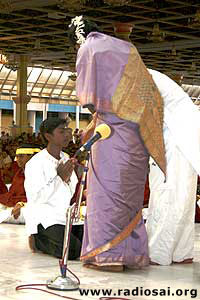
|
| |
Offering pranams to parents -
Indian way |
A Tamil song was then sung by a Malay teenager which denoted the same idea as in the English Chorus and English Solo:
Ovvoru Naalum Unnani Vannangindren
Unnai Vanngindrum Arulvai Irraivaa
En Ellam Yeannamum, Sollum Seyallum
En Ovvoru Moochum Nin Arul Bhagavan
Thandhai Thai Meethu Anbu Sellathuvom
Avargal Sollpaddi Endrum Nadapom
Inimai Menmai Endrum Nadapom
Aepothum Pesi Sevai Seivom
Anbum Amaithiyum Ithaiyatil Tekki
Aepothum Avargalai Mahillveppom
Mathavum Pithavum Munnarri Deivam
Irraivan Nammakalittha Kann Kanda Deivam
As the singer wholeheartedly rendered the song, simultaneously three Malay teenagers dressed in the traditional dress of the Hindu parents and their son came to the centre stage. The boy then prostrated at the feet of his parents with full love and respect.
Meanwhile, the narrator reminded the assembled devotees of Rama and Pundalika, the ideal sons of Bharat by saying, ““Mata, Pita, Guru Daivam.” This is something that is propagated in the Hindu culture. In Hinduism, parents are looked upon as God Himself. It is stated in the Srimad Bhagawatham that: “Love and obedience to our parents is our first duty”.
God Himself has shown us an example of this. When Lord Rama was about to be crowned as prince of Ayodhya, at the last moment things took a strange turn. He was told to keep up the honour of his father’s word and so he went into exile for fourteen long years, forsaking his palace and kingdom.
The story of Pundalink clearly shows the importance of filial piety. Pundarika used to visit the temple of Lord Panduranga everyday. One day he was engrossed in serving his parents and hence could not visit the temple. So, Lord Panduranga Himself came to Pundarika. At that time Pundarika was pressing the feet of his parents and so he requested Lord Panduranga to take His seat and wait. So, saying, he passed a brick to the Lord as there were no chairs and sofas in those days. After attending to his parents, Pundarika offered his due respects to the Lord Panduranga.
The Lord was immensely pleased with his devotion to his parents and blessed him profusely, saying, “God comes to you on His own when your behaviour is good. There is no service greater than service to parents. Consider service to parents as service to the Lord.”
A Malay singer then came and sang a beautiful Hindi song, praying to Bhagavan to bless him to render incessant service of his parents, speak softly and lovingly with them and follow their every instruction.
The verses of the Hindi song:
Vinti hai Swami tumhe har savere,
Sharan de, raah de he prabhu mere
Har vachan, vichaar, har karm mein mere,
subah shyam har din har saans mein mere
Pooja karun hurdam mai mata aur pita ki,
maan karun hurdum unki har aagyaa ki,
Dheemi ho meethi sadaa meri boli,
seva Karun sadaa yahi hai pooja meri
Khushi doon hurdum unko hai pooja meri,
Dil mein hurdum ho Prem aur ho shaanti,
Dharti par mere hain Prabhu ke roop vahi,
Yahi Prabhu ki Kripa, anmol den yahi.
Now the entire group brimming with intense love for Bhagavan started praying to Bhagavan to bless them with His Love and Grace. Their prayer was in the form of an English song.
Take my Hand dear Sai Sathya Sai
Take My Hand and walk me through this land
Take my Hand dear Sai Sathya Sai
Take My Hand and walk me through this land
Take My Heart Dear Lord Sathya Sai
Take My Heart and fill it with Your Love
Let the love in me be love divine
Walk with me My Lord, Your Hand In mine
Sai Rama Ram Sai Ram
Sai Rama Rama Sai Ram
Sai Rama Ram, Sai Ram
Walk with me My Lord Your Hand in mine
We love you, Our Dearest Swami.
The singing reached a crescendo as the group prayed fervently to Swami to come amidst them and bless them with group photos. When a devotee calls out to the Lord with intense devotion, it is impossible for the sweet Lord to hold back Himself as He rushes to His devotee. This is what exactly happened that evening. Bhagavan walked down the steps and spoke to the group and blessed them with group photographs.
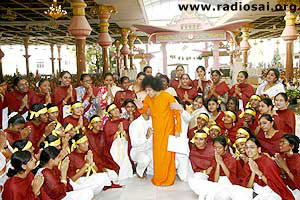 |
 |
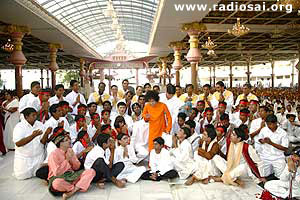 |
Swami glad to pose with Malaysian youth |
|
Blessings in abundance |
The function did not end with the photographs. He asked them to sing bhajans. As the group sang bhajans, Bhagavan called a Malay singer, Sri Manoj Nair Venugopalan, spoke to him and then materialized a gold chain for him. The ever-compassionate Lord called a Sai Sister from the group, Haanusia Privithi Raj and blessed her with a gold chain.
Bhagavan then received the Aarti and went back to the interview room. Later, the Bhajans were sung as usual at five o'clock in the Bhajan Hall and Swami retired to His residence after Aarti at 5.30 pm.
Christmas Celebrations in the Presence of the Divine Father
How can one truly translate into words what happens during Christmas at Prasanthi Nilayam? Words become dumb at the door of the spirit. Christmas celebration at Prasanthi can only be experienced to realize its full import! It is a celebration of divinity. Children of God from almost all countries, religions, cultures and races troop in their thousands to Prasanthi to experience their inner Divine principle in the manifest divine presence of Bhagavan Sri Sathya Sai Baba. They come to experience the feast of divine awakening; the outpouring of the universal Christ Consciousness; the realization of the wondrous truth of our common divine origin. The Divine Love magnet, Sai Baba, draws His children from all over the globe to taste the thrill and bliss of how humanity can unite in Divinity. Beyond race and beyond colour, beyond the barriers of creed and caste, Christmas in Prasanthi Nilayam brings all to the awareness of the Fatherhood of God and the brotherhood of man. We are the children of the same Divine Mother.
A lot of preparation precedes the actual celebration of Christmas at Prasanthi Nilayam. So much work is done behind the curtains. First, the Christmas committee draws a comprehensive program in a planned format, decoration of the entire ashram, the adult choir, the children’s choir, presentations of speeches and dramas, etc.
On December 7 Swami gave His blessings to the program presented by the Christmas committee. Thereafter, the wheels of transforming the entire ashram into the festive mood of Christmas were put into motion.
Organizing The Choir
The adult and children’s choir were formed on December 15. The nine auspicious days of practice for these two choirs are a beauty to behold. Beyond coming from different linguistic and cultural backgrounds, all spoke and sang in the language of Love. Everyday, there were two practice sessions: two hours in the morning and two in the evening at the “double-decker” building.
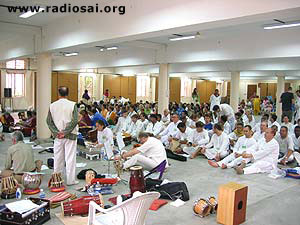 |
 |
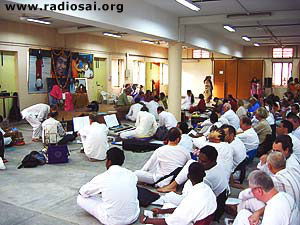 |
Christmas Choir Rehearsal |
|
It was a joy to be there |
The adult and children’s choir directors, Sylvia Olden from Australia and Elma Badings from Holland were simply channels of divine melody. Gradually but surely, they were able to mould the choirs into a body with one voice and one heart.
This year, about 680 ladies and 425 gents hailing from more than forty countries comprised the adult choir. Every rehearsal was a satsang. Sylvia, the director, knows the art of integrating episodes of her many soul-thrilling Divine encounters with the Lord at intermediate times of the rehearsal. Her stories were like “soul-snacks” and gave a lot of energy and morale boost to all in attendance.
Only the master of the dance knows the agony and patience of teaching her children the steps of the dance. In nine days the children had to learn every song and two were in Spanish. To bring these children to that Divine standard which our Lord Sathya Sai always expects was nothing but a miracle. Elma Badings, the children’s choir director was a channel of this miracle. According to her, the children were very eager to give a wonderful gift to Swami in the form of their singing. The children’s choir this year comprised of eighty-two kids between the ages of six and fourteen.
For both the adult and children’s choirs, expert musicians including a pianist, violinists, flutists, drummers and other percussionists, guitar players and trumpeters were in abundance. Their expert instrumental harmony added beauty and bliss to the rehearsals.
The Decorations Team at Work
To put the ashram into ‘Christmas costume’ with glistening Christmas lights; adorned Christmas trees; nativity scenes; colourful candles and praying angels is the duty of the Christmas Decorations Committee. Swami gave His permission for the decorations to start going up on the 21st evening. The Team started with a garland for Ganesh in the Mandir and then moved to Swami’s residence and the Poornachandra auditorium.
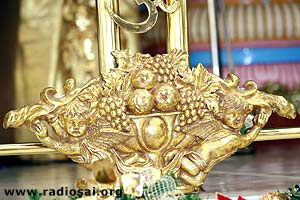 |
 |
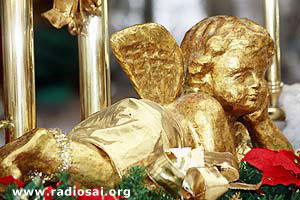 |
The Angels at Swami's Lotus Feet... |
|
... and another in attendance |
According to Milena Kunz, the decorations coordinator, the white trees that adorn the Ganesh idol symbolize purity of heart. The nativity scene this year has been designed to carry the message of Sarva Dharma - the unity of religions. Every year the decorations committee spends weeks of loving service in preparation for all these items that are used.
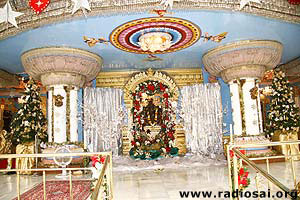 |
 |
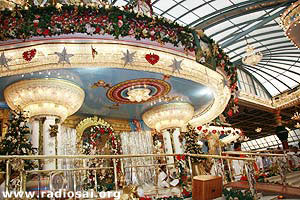 |
The Mandir: a finished work of art |
|
Bedecked with holly and stars |
After three days of putting up the decorations, the Sai Kulwant Hall, gates and fences, canteens and temples had all taken on the Christmas look. And the whole ashram was in the spirit of Christmas.
Christmas Dinner
In God’s house nothing is lacking. The Divine Mother knows how to give Her children the best of treats and on Christmas Eve Mother Sai gave Her children a divine dinner. The canteen hall had been decorated with candles on all the tables and the meal was eaten in candle light alone. More than 1,500 devotees were able to take this blessed feast and the room was filled with love.
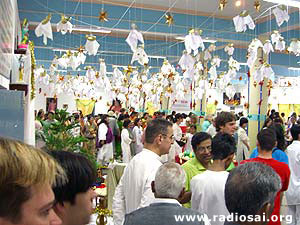 |
 |
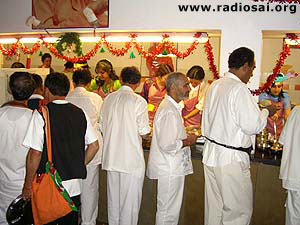 |
1500 came for the feast |
|
The best Christmas thus far |
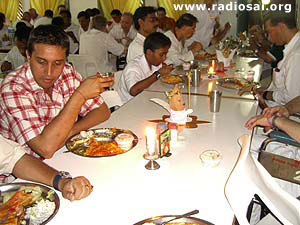 |
|
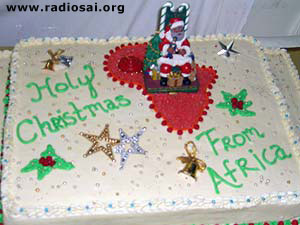 |
Dinner by candlelight |
|
Best wishes from Africa |
The kitchen team had been preparing for a week. For this grand communion the menu was a wonder to behold: tomato soup, Chinese vegetables, lasagne, mashed potato with cheese, Russian salad, pancakes, and caramel nut ice cream. The Hungarian ladies made 2,000 pancakes in two days. Everyone who participated in the dinner could testify the truth of the biblical saying “Taste and see that the Lord is good.”
Christmas Eve - 24th December
By 2 p.m., the whole of the Kulwant hall was already full to maximum capacity with devotees. It was a sea of heads waiting anxiously for the great appearance of their Lord. At about 4 p.m. the Vedic chanting started, a sign that the yearning of the devotees had melted the compassion of the Lord to reveal Himself.
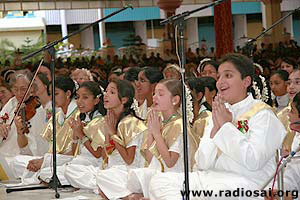 |
 |
 |
Such joy on their faces |
|
More little Angels at the Feet of the Lord |
After giving darshan, beloved Swami came to the dais to light the Christmas candles. After Swami was seated, He blessed the director of the children’s choir, Ms. Elma Badings to start the children’s presentation. The children were like little sweet angels adorned in heavenly splendor. The purity and love of their songs melted the hearts of one and all. Among their many renditions were:
“Mantra Song”, which gave praise to Lord Ganesha, Rama, Krishna, Shiva and Swami; “We wish you a Merry Christmas”; “Silent Night”; “O Come All Ye Faithful”; and “Joy to the World”.
 |
 |
 |
Ms. Elma Badings receives blessings |
|
Blessing Ms. Sylvia Olden |
Next, Ms. Sylvia Olden went with flowers to the Lord to pray for His blessings upon the adult choir. The Lord of compassion gave His consent to start their presentation. Their renditions electrified the whole mandir with vibrant energy. Everyone was in a joyful mood, clapping, shaking heads, humming or waving.
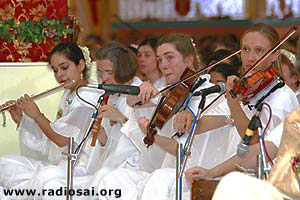 |
 |
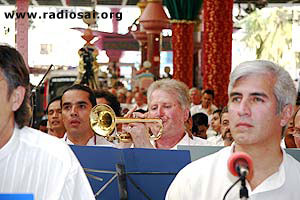 |
Dedicated musicianship |
|
Playing only for Him |
Even Swami Himself was tapping His fingers at the rhythm of the songs. How pleasant and how blissful it is when brothers and sisters share in such harmony. Indeed, there is no greater force than Love – unconditional Love, boundless and pure. Only the power of Divine Love can bind the hearts of humanity in an unbreakable bond of Unity. The adult choir presented about fifteen songs which included:
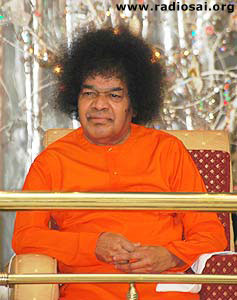 |
 |
 |
Swami enjoying the singing |
|
Blessing the choirs and all |
“You are my Shepherd in green pastures”, “Come and serve the Lord with Joy”, “Almighty God”, “Jesus be with us”, “Soham Sai Om”, “Turn your eyes upon Swami”.
After the presentations of the two choirs, Swami blessed all with prasadam and gifted the two lady conductors, Sylvia and Elma, with beautiful saris - only the Lord can cloth us with the garment of salvation.
The Christmas Eve programme came to an end with arathi offered to Bhagavan at about 5:30p.m.
The Christmas Morning Programme By Sathya Sai Students
At last, the long awaited moment arrived - Christmas morning - heralded by the radiance of the rising sun, to awake all to the light of Christ within. The aura of Christmas filled the whole ashram atmosphere with Atmic bliss and fragrance. One can feel the tingling sensations in the air. Christmas carols were sung by the children’s and adult choir in the Sai Kulwant hall. Christmas melodies like “Silent Night”, “Joy to the World”, and “Come let us adore Him” reverberated in the pillars of the mandir. Meanwhile, nagasankeertan was going on around the usual route preceded by the Vedic chanters. Verily, Heaven and Earth were one in joy.
 |
 |
 |
Singing for the Lord on Christmas morning |
|
The love of God at Christmas... what more is needed? |
At about 8:50 a.m. there was a hush; silence descended like dews from Heaven – a sign that beloved Swami was about to appear for His divine darshan. Swami came in His car robed in ethereal white. After lighting the Christmas candles, Swami sat in His chair in the dais. All drank the nectarine bliss of Sai’s tangible Divine Presence.
With Swami’s blessings the Sri Sathya Sai Institute brass band and the primary school violin boys took the stage. The violin boys were the first to perform to the thrill and joy of all devotees present. As they ended with a jazzy version of “Jingle bells”, little ‘Santa Clauses’ went around among the seated devotees to distribute sweets.
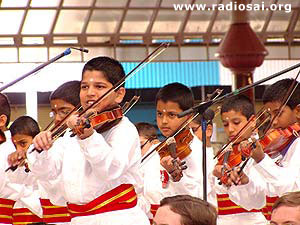 |
 |
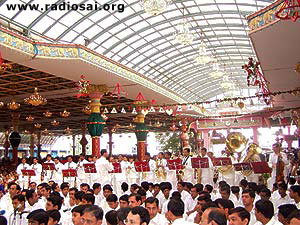 |
The little violinists |
|
The Institute Brass Band |
Next, Swami gave His blessing to the Institute Brass Band to start their presentation. It is true! Music is the ‘food’ of the soul. The Lord Himself is a lover of music. As the whole mandir resounded with the melody and rhythm of the flutes, piccolo, clarinets, trumpets, saxes, trombones, baritones, tuba, sousaphone, and percussion instruments, it was as if the heavens stooped down in awe and wonder: “Where comes this ethereal music that charms the ears of angels?”. “It could be nowhere else but in Prasanthi Nilayam where the Lord of Lords and King of Kings has taken form as Sathya Sai Baba”, they concluded.
As the brass band came to an end it was the turn of Swami’s students from the eighth class up to the post-graduate level, to present their soul-thrilling Christmas songs. Each song like, “Jesus is alive today”, “Jesus the Lord has shown the way to me”, was preceded by words of wisdom between a child and his uncle. These students sung from their hearts and uplifted the souls of all to a realm beyond all worldly concerns.
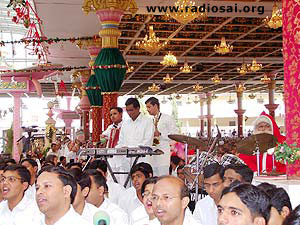 |
 |
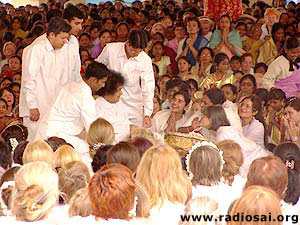 |
More Christmas music |
|
Darshan for the ladies |
This was not the end. Swami asked the boys to start bhajans. And while bhajans were going on, beloved soul-charming Swami delighted all by going round to give His darshan and to cut the Christmas cakes. This was an exciting moment of grace for thousand of devotees gathered at the Lotus Feet. Swami went first along the ladies’ aisles, and then the gents’ aisles – showering boundless Love and Ananda.
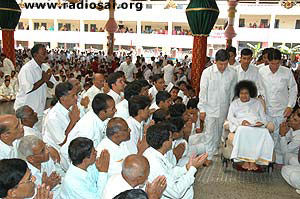 |
 |
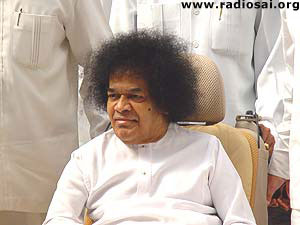 |
Darshan among the men |
|
Blessing all with His Love |
Christmas Evening Programme – Two Speakers
Christmas activities came to a crescendo with the Christmas evening programmes, which ended with Swami’s Divine discourse that made all roll with laughter and bliss. At about 3:45 p.m. Bhagavan arrived for darshan robed in radiant red; his face radiating heavenly bliss and joy. It is a joy that told how much He loved Jesus, and how much He wants us to be like Jesus.
John Behner, the Christmas Committee chair person and the South American zonal coordinator, introduced the evening programme, and the speakers of the day: Mr. Arthur Hillcoat and Father Charles Ogada. In his introductory speech, John told a story of how Swami had recently healed his eye without surgery. Bhagavan is the surgeon who operates without surgical instruments. Four years back, Swami had told John that He Himself will fix his eye, and that he should not go to any doctor. John then prayed to Swami to heal his ‘spiritual’ sight too.
 |
 |
 |
Mr. John Behner introduces the evening programme |
|
Mr. Arthur Hillcoat speaks |
The first speaker was Mr. Arthur Hillcoat. In his brief talk, he exhorted devotees to put into practice at least one teaching of Bhagavan. In this way their lives would be fulfilled. He also reminded us of our good fortune to be chosen as Swami’s instruments of His Divine mission.
The next speaker was Father Charles Ogada, a Catholic priest from the state of Abia in Nigeria, currently teaching at the Sathya Sai school in Zambia. Father Charles said, “The essence of Christmas is to realize the Christ Consciousness which is but our inner Self. The purpose of our lives is to realize our true nature.” He went on to narrate the thrilling story of how he came to the Lotus Feet of Bhagavan, or as he put it, how Bhagavan came to him.
He continued to say, “I had lead a normal life until the age of seventeen. I was to study medicine at a prestigious university in Nigeria. One day as I sat in solitude, I heard a Divine voice asking me what I wanted to do with my life. Recognizing the voice to be that of God, I replied, ‘What else Father, but to offer this life to You.’” His life thus took an unexpected turn as he decided to study to be ordained as a Catholic priest. However, after nine years of religious studies, he was frustrated as he still could not come face to face with the God he was praying to. One day one of his teachers mentioned the name ‘Sai Baba’, and this name he said, “Shook the foundations of Heaven within me. There is tremendous power in that name.”
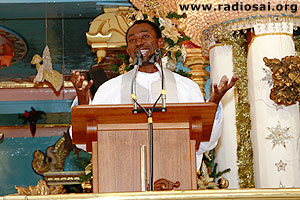 |
 |
 |
Father Charles Ogada speaks |
|
Father Charles Ogada receives Swami's blessing |
A few weeks later, Bhagavan appeared in his dream and said without speaking, “I am the One you have been seeking”. He came to Prasanthi Nilayam in 2001 and was overwhelmed by the Love of Bhagavan which he said was like the Love of millions of mothers. When he met Swami, he felt he was Jesus. For had Christ not said, “I and my Father are One”. Father Ogada concluded his thrilling talk with a prayer to Swami to make the entire world aware that the Father, who Jesus had said had sent Him, is now with us.
After his speech, Swami's face lit with joy as He said to him, "Swami is very very Happy". Swami then materialized a glistening gold chain for him with a golden pendant engraved in Swami’s image. Swami’s outpouring of Love was a sight for the gods to behold as He put the chain on his neck, like the Father hugging His son. Even the angels peeped down from Heaven to experience the thrill of the scene. Who can possibly describe what the Lord has prepared for those whom He loves?
Swami’s Divine Christmas Discourse
The moment of moments came when Swami stood up to give His divine discourse. Swami thrilled one and all with memories of His Divine tour to Africa, namely Uganda, Tanzania and Kenya. Swami related how Mr. Idi Amin was very fond of Him and used to have the darshan of Swami both in the morning and evening. During His stay, he arranged a dinner for Swami and meticulously got all instructions from Dr. Patel as to Swami’s menu and how it should be prepared. On the day of the dinner, Idi Amin’s wives stood in rows on either side and greeted Swami with veneration. Idi Amin himself introduced each of them one by one to Swami.
On the day Swami was to leave, which happened to be Guru Purnima day, Idi Amin was suffering from pangs of separation and started shedding tears pleading with Swami not to leave them. Not only did Amin but the Africans were all in tears and fell at the feet of Swami praying: “Bhagavan! Please spend this day with us.” Their devotion melted the heart of Swami and made Him spend Guru Purnima with them. An important miracle happened on this day. The Africans had wished to take photos with Swami. Swami told them that they might silently pray in their heart so that their requests may be fulfilled. To their joy, each of them found a photo of Swami lying beside them.
Swami found the same deep devotion when He visited Tanzania and Kenya. Swami revealed that the gifts that the African devotees gave to Him (which comprised mainly of dinner sets, tea sets in gold colour, etc.) are still with Him and are used to host high dignitaries like prime-ministers and governors. According to Swami, “The devotion of Africans is indescribable”.
 |
 |
It is not only the people of Africa that are devoted to Swami, but also the wildlife of Africa. Swami delighted all with stories of His journey through the wildlife habitats: how they gave apples to the crocodiles and how these crocodiles, captivated by the divine darshan, could not even remember to eat the apples, but kept them in their mouths while gazing constantly at Swami. When the big heads of mighty elephants saw Swami sitting in the car, they raised their trunks in veneration and paid obeisance to Swami. Swami concluded that the noble qualities in these animals are not to be found even in human beings, as there was no feeling of hatred whatsoever in those animals.
Swami stood for a full hour filling the hearts of the devotees with stories of His divine leelas. He concluded the discourse with the words: “Truth is eternal. It is only when you follow this eternal truth that your name will remain in the annals of history forever. Eternal truth will earn eternal peace for you.”
At about 6 p.m. arthi was offered to Swami by the two speakers of the day to conclude the wonderful Christmas festivities and leave memories to be cherished for a long time.
Christmas Mass At Prasanthi Nilayam
It came as a pleasant surprise when beloved Swami graciously approved and gave His blessing for a Christmas Mass to be conducted in the very abode of Supreme Peace, Prasanthi Nilayam. This event was a historic moment in the annals of the Christian Church. It was an auspicious sign that Swami has accepted the prayers of the priest on Christmas evening for Swami to bring the whole Christian Church to His lotus Feet and lead her to the complete truth.
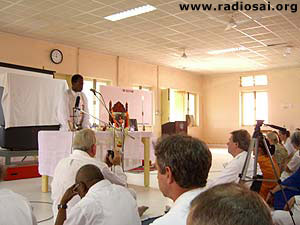 |
 |
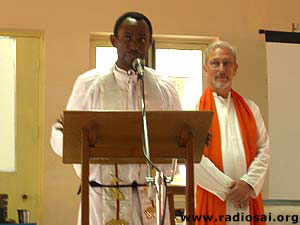 |
The Mass being said |
|
The Sermon |
The Mass (Holy Eucharist) is the greatest symbol of the Christian Church. In fact, whenever the Mass is said the whole Church is believed to be present. When Swami gave His divine Blessing, the Mass became the very consummation, the seal and the fulfillment of all the prayers the Church has ever offered to the Father through the Son, Jesus Christ.
The Mass was conducted on 27th December by Father Charles Ogada as officiating priest and with him was a monk of the order of Satchitananda founded by the Dominican priest, Father Anthony Elenjimittam.
For all in attendance the Mass was a deep moving spiritual encounter. It was a Mass that transcended the barriers of creed and caste, colour and language and transported the participants to the experiential awareness of Swami’s words: “There is only one religion, the religion of Love.” (Radio Sai will be broadcasting this Mass on a forthcoming Sunday, in its new morning programme “Moments of Oneness”.)
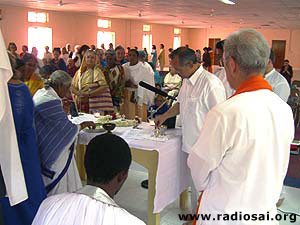 |
The Holy Eucharist |
- Heart2Heart Team. |

























